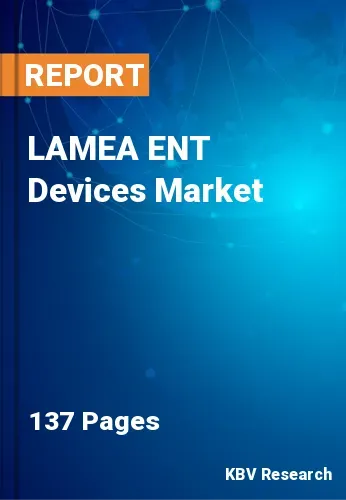The Latin America, Middle East and Africa ENT Devices Market would witness market growth of 8.7% CAGR during the forecast period (2022-2028).
ENT diseases are serious medical issues that have severe societal and economic implications. Hearing impairment impedes language development and academic progress in newborns and young children. Adults who experience it face difficulties in their career and social lives, including social rejection.
Hearing loss can be brought on by a variety of conditions, including infections in childhood like measles, mumps, and meningitis, exposure to loud noise for an extended period of time, chronic otitis media, head/neck injuries, some nutritional deficiencies, congenital abnormalities, infections, and perinatal problems, use of ototoxic medications like some chemotherapies and antibiotics, industrial solvents, genetic disorders, and aging.
More often reported in recent decades is the increased occurrence of ENT-related ailments. The carbon dioxide laser is the one that is most frequently used in ENT surgery. Its key benefit is precision cutting with a very small zone of coagulation, which significantly lessens bleeding after incision. The treatment of juvenile papillomas of the vocal fold and the treatment of minor vocal cord carcinomas or recurrences after these have undergone radiation therapy benefit from the use of lasers.
The Ministry of Health and Prevention of the United Arab Emirates is the government agency in responsibility for medical device registration as well as laws governing other medical goods, such as over-the-counter and prescription pharmaceuticals. In order to make Dubai a regional hub of superior healthcare, the UAE government intends to increase the number of medical tourists visiting the country. The UAE is an import-driven market for medical devices, and it is expanding quickly to keep up with the nation's burgeoning healthcare infrastructure.
The Brazil market dominated the LAMEA ENT Devices Market by Country in 2021, and would continue to be a dominant market till 2028; thereby, achieving a market value of $602.7 million by 2028.The Argentina market is experiencing a CAGR of 9.3% during (2022 - 2028). Additionally, The UAE market would display a CAGR of 8.4% during (2022 - 2028).
Based on End-use, the market is segmented into Hospitals & Ambulatory Surgical Centers, ENT Clinics and Homecare. Based on Product, the market is segmented into Surgical ENT Devices, Diagnostics ENT Devices, Hearing Implants, Hearing Implants and Nasal Splints. Based on Surgical ENT Devices Type, the market is segmented into ENT Hand Instruments, Sinus Dilation Devices, Otological Drill Burrs, Radiofrequency Handpieces and Others. Based on Diagnostic ENT Devices Type, the market is segmented into Rigid Endoscopes H2, Flexible Endoscopes, Robot Assisted Endoscope and Hearing Screening Device. Based on Rigid Endoscopes Type, the market is segmented into Sinuscope, Otoscopes and Others. Based on Flexible Endoscopes Type, the market is segmented into Bronchoscopes, Laryngoscopes and Nasopharyngoscopes. Based on countries, the market is segmented into Brazil, Argentina, UAE, Saudi Arabia, South Africa, Nigeria, and Rest of LAMEA.
Free Valuable Insights: The Global ENT Devices Market is Predict to reach $30.7 Billion by 2028, at a CAGR of 5.5%
The market research report covers the analysis of key stake holders of the market. Key companies profiled in the report include Smith & Nephew PLC, Sonova Holding AG, GN Store Nord A/S, Ambu A/S, Stryker Corporation, Karl Storz SE & Co. KG, Olympus Corporation, Richard Wolf GmbH, Cochlear, Ltd., and Starkey Laboratories, Inc.
By End-use
By Product
By Country

Our team of dedicated experts can provide you with attractive expansion opportunities for your business.

